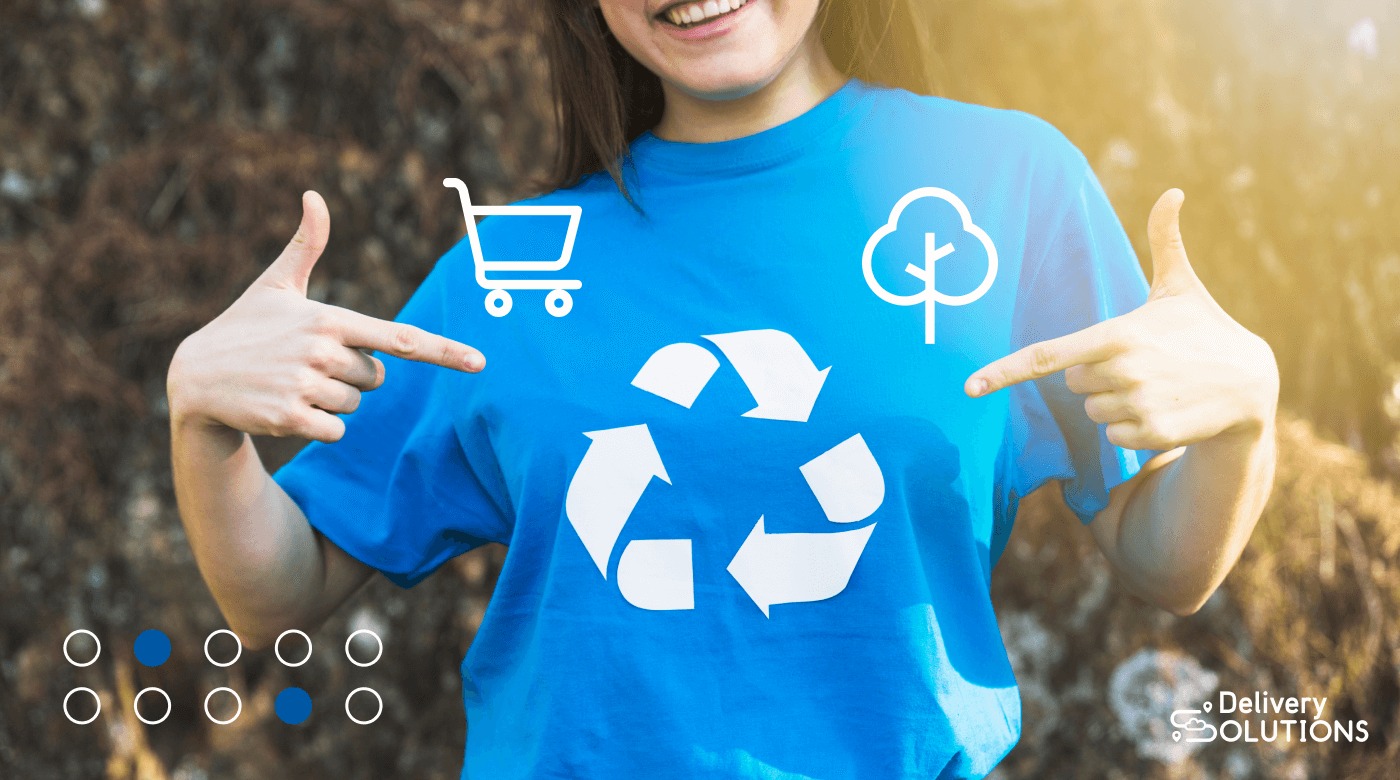If you're a retailer, you probably know the headache of managing end-of-life and out-of-season items. It's a persistent problem that seems to have no end, eating into your profits and creating logistical problems.
But it's not just about the financial drain; the environmental toll is even more alarming. The disjointed approach to handling these items is unsustainable, leading to waste and a growing environmental crisis. The industry is crying for a solution, a strategy that addresses the economic and ecological concerns tied to product disposition.
This is where DeliverySolutions steps in, bringing our revolutionary omnichannel unification platform. Imagine a world where every item, at the end of its lifecycle, finds a new purpose, a new home, steering clear of landfills and instead contributing positively to the economy and the environment.
The platform makes this vision a reality, offering a streamlined, efficient, and green solution to a problem as old as the retail industry. It's not just a platform; it's a pathway to a sustainable, profitable future.
The problem with no return disposition system in place
Ignoring a return disposition system costs companies money and harms the environment. Let’s review the issues in detail.
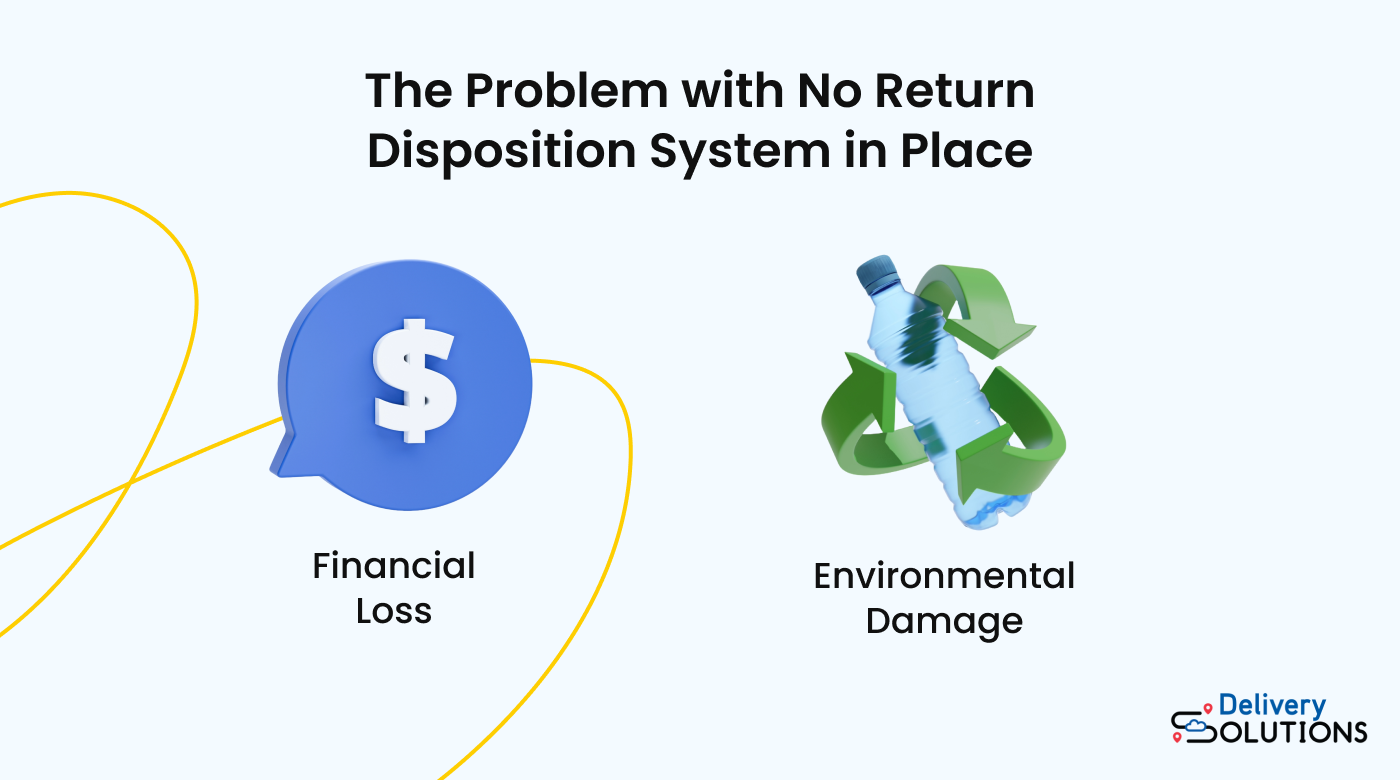
Economic issues
When customers return a product, companies have three main options: restock, discard, or send it to a landfill. Operating without a structured return disposition system directly wastes money.
How?
Storing returned items that can't be resold consumes valuable warehouse space, increasing storage costs. Restocking fees can also increase quickly, especially if the item requires refurbishing. Most critically, companies miss out on the potential resale value of returned items that could otherwise be resold or recycled.
It's like buying a brand-new car only to let it collect dust in the garage.
Environmental issues
The environmental impact of not having a return disposition system is equally alarming. When companies don’t manage returned items properly, they contribute to various forms of pollution:
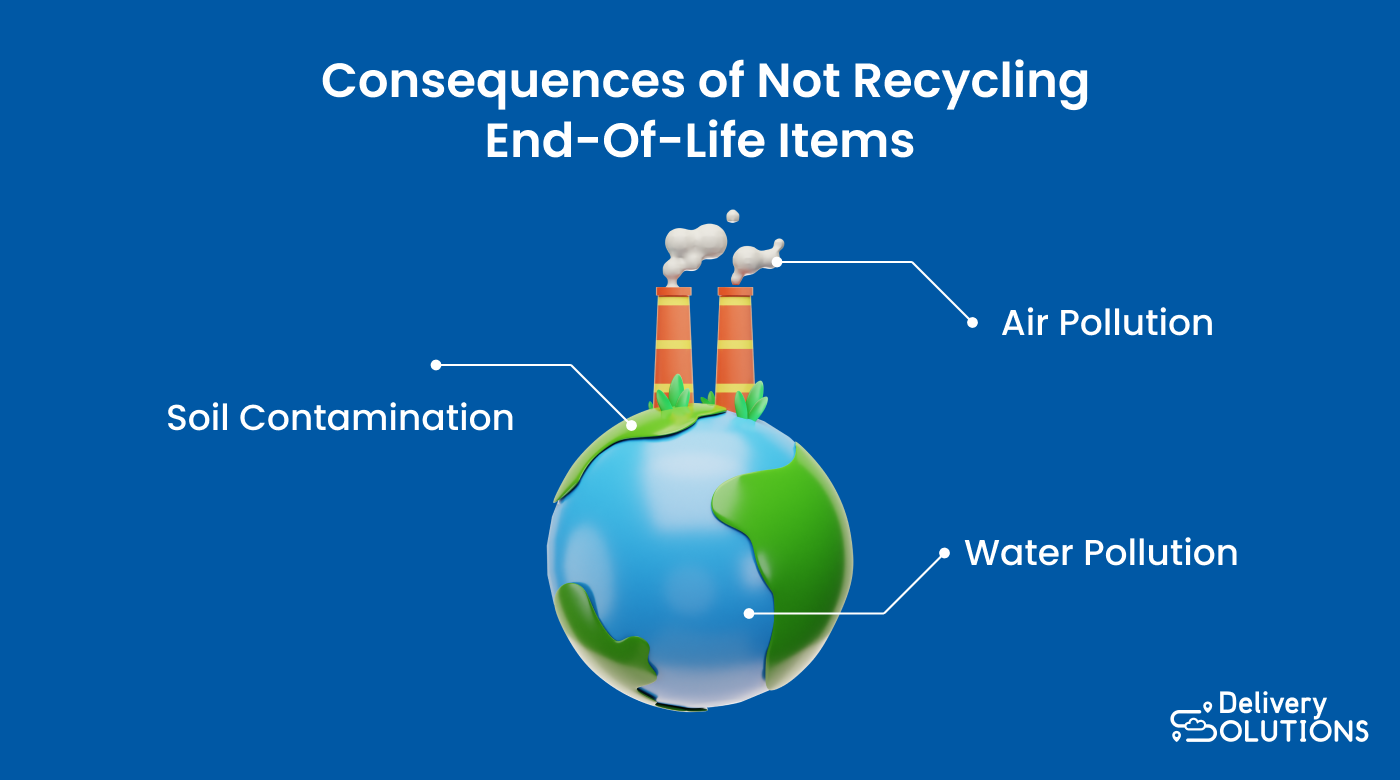
- Soil contamination: Improper disposal of electronic items, plastics, and hazardous materials can lead to soil contamination. This affects plant life and poses risks to animals and humans who rely on that soil for sustenance.
- Water pollution: Discarded items often find their way into the water. They release harmful chemicals that affect aquatic life and contaminate the water supply.
- Air pollution: When waste is burned or decomposed, it often releases harmful gases into the atmosphere, contributing to air pollution.
A positive example to follow
In 2022, IBM recycled 58.6% of its end-of-life products and resold 35.6%, leaving a mere 0.4% for landfilling or incineration. These numbers aren't just impressive; they're a roadmap for other companies to follow. More retailers should contribute to such encouraging statistics.
Recycling and reselling are actionable steps toward sustainability. By adopting these practices, companies reduce waste and align with the global shift toward environmental consciousness. It's a win-win: save money and save the planet.
The solution: An omnichannel approach
Technology has the power to drive sustainable solutions, and at DeliverySolutions, we lead the charge with our Omnichannel Experience Management platform. This enterprise-grade system orchestrates every aspect of the customer experience, from logistics and pick-up to returns and post-purchase.
Route end-of-life or out-of-season items to resell platforms or donation centers. You don’t have to deal with manual sorting or waste anymore.
Benefit #1: Increase profits
With such a returns process, you're saving the planet and boosting your profits. How? By leveraging an intelligent disposition system that knows exactly where your returned items will generate the most revenue.
Consider the costs you incur when a product gets returned, like storage fees, restocking charges, and the lost opportunity to resell at full price. Slash these costs by smartly routing each returned item to its most profitable destination, whether back to your shelves, a reseller, or even a donation center where you can claim a tax write-off.
The result? Long-term savings that go straight to your bottom line.
But let's remember the bigger picture. Traditional business models follow a linear economy — make, use, dispose. It's outdated and unsustainable. DeliverySolutions can help with the circular economy model, where products and materials are reused, repaired, and recycled.
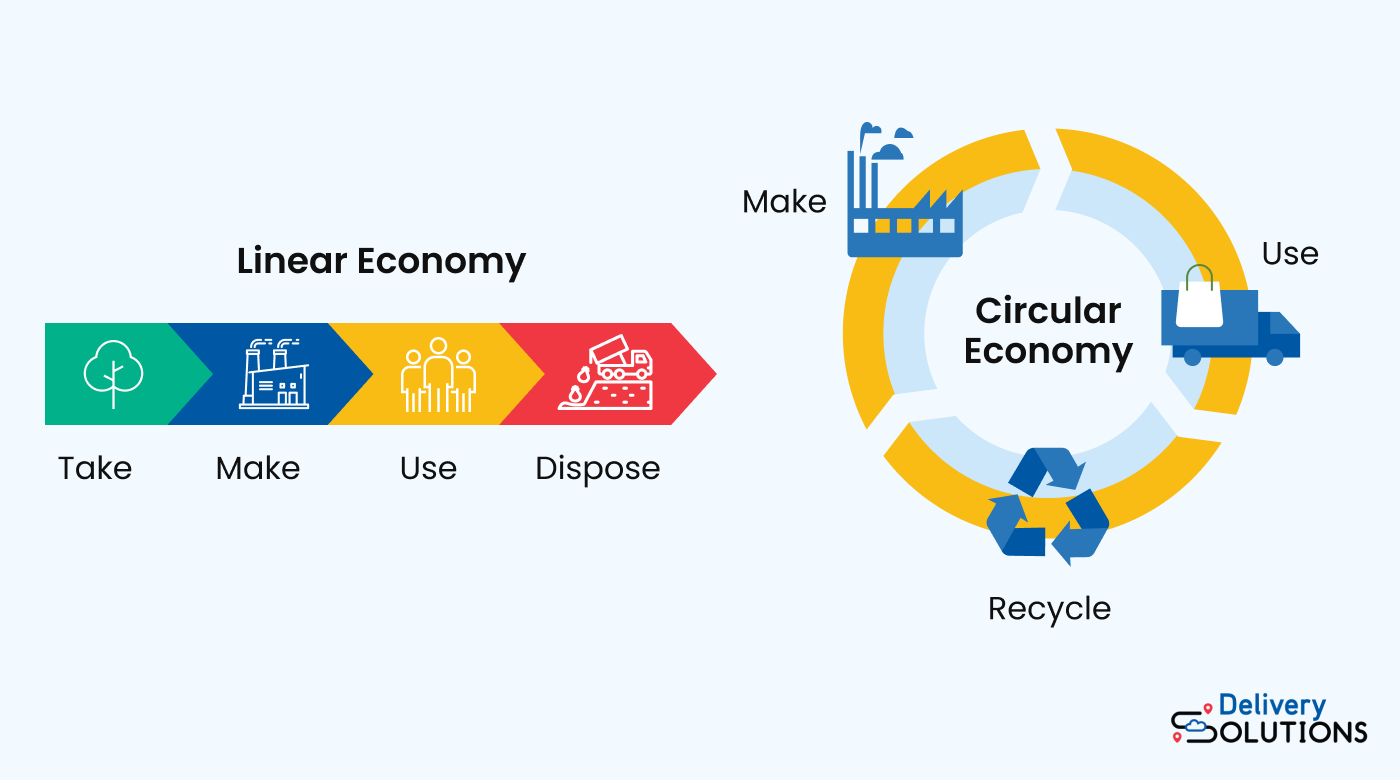
So, following the circular economy allows you to make money while making a difference at the same time. You're part of a system that values both profit and the planet.
Benefit #2: Minimize environmental impact
You're actively contributing to a more sustainable future! Our intelligent orchestration system ensures that returned items get a second life, whether that's through reselling, recycling, or donating. This is about making a tangible impact.
How it works
Stage 1: Procurement
It all starts with sourcing your products. This sets the stage for everything that follows.
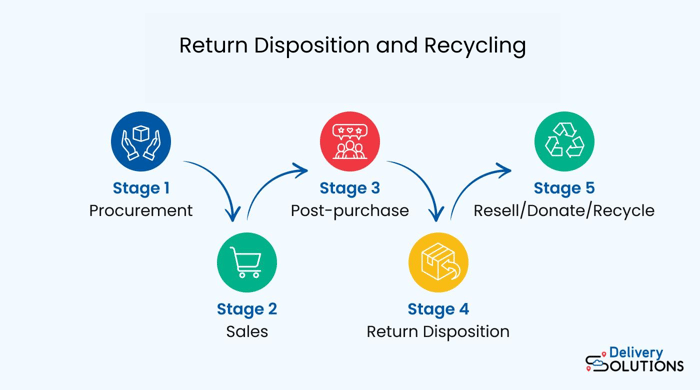
Stage 2: Sales
You can build alignment between your inventory management and customer interactions in the sales stage to boost efficiency and profitability. Real-time data analytics can ensure you're selling the right products to customers at the right time.
This isn't just about moving inventory; it's about maximizing each sale's value for long-term revenue growth.
Stage 3: Post-purchase
After you seal the deal, satisfying that customer is your next big move. This is where Delivery Solutions can step in with a range of post-purchase solutions.
From automated follow-up emails to personalized product recommendations, the platform keeps the customer engaged and satisfied. It also offers easy-to-navigate return policies and customer service portals, making post-purchase interactions hassle-free.
The end game? Not just a one-time buyer, but a loyal customer more likely to make repeat purchases.
Stage 4: Return disposition
Your existing teams and systems evaluate the condition, demand, and other factors related to the returned item. Once that information is tagged, our OXM platform can establish orchestration rules that route the items to the most suitable channel, which the merchant sets up beforehand. It can be restocking for a quick resale, sending to a refurbishment center, or routing to recycling facilities.
This whole returns process saves you time and maximizes the value of each returned item, turning a potential loss into a win.
Stage 5: Execute the plan
If the analytics from Stage 4 determined the item should be restocked, it goes back on the shelf. If refurbishment was the call, it's off to get spruced up. And if recycling is the most sustainable option, it's directed to the appropriate facility. The platform can also route items to donation centers if that fits best. Orchestration rules can be executed for any scenario.
This seamless execution ensures both economic and environmental optimization.
Ready to streamline your return disposition system?
Navigating the complexities of returns is no small feat, but it's crucial for your bottom line and the planet. And that's where returns with DeliverySolutions comes into play.
Think of returns not as a loss but as an untapped opportunity. With DS, you can maximize the value of each returned item economically and environmentally.
Beyond the immediate financial gains, we can position your brand as a sustainability and customer satisfaction leader. These are the two attributes that today's consumers find highly appealing.
If you're committed to elevating your return process and making a significant impact, now is the time to act. Book a demo today to get started with DeliverySolutions and improve your business.
Ryan Caldarone
Ryan is a Sr. Digital Marketing Manager with over ten years of experience in B2B eCommerce, specializing in brand storytelling and content. Having contributed to hundreds of creative projects for SMBs and startups across the tech, energy, and fine arts sectors, Ryan brings diverse perspectives.
Topics from this blog: Efficiency Logistics
